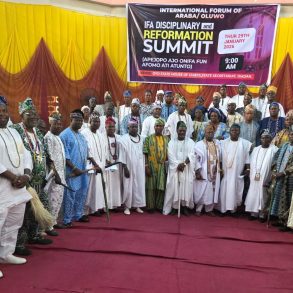The Ogun State government has concluded plans to introduce an improved methodology in teaching science subjects in Senior Secondary Schools and state technical colleges.
commencement of the second phase of the training for 750 science and technical subject teachers across the State.
Sponsored by the World Bank through the State Economic Transformation Project (OGSTEP) under the State Ministry of Education, Science and Technology, the Permanent Secretary, Mrs. Abosede Ogunleye in an interview explained that the new methodology was necessitated by the shortfalls observed in the teaching of science subjects and the need to improve on them in line with global best practices.
Simbo Olayinka
Communications Officer, (OGSTEP) said in a statement that the permanent secretary disclosed that the Progressive Mathematics Initiative Progressive Science Initiative, PMI-PSIR approach was modified and developed for Ogun State by the New Jersey Center for Teaching and Learning in the United States of America.
Mrs Ogunleye further hinted that the second phase of the training has been scheduled for the end of July 2023 and that the 750 beneficiaries of the first batch of the training which were drawn from all the 20 local government sreas of the state would partake in the second phase.
She explained that the training which was meant for over 2000 science, technical, Engineering and Mathematics (STEM) teachers in the state was designed as a ‘train the trainers’ method such that the beneficiaries of the training would train the rest of the teachers.
On her part, the Project Coordinator, Mrs Mosunmola Owo-Odusi disclosed that apart from the PMI-PSIR being a method for delivering content by STEM teachers, the classrooms for teaching science and Technical subjects would be upgraded with relevant digital equipment and resources.
Speaking with some of the beneficiaries of the first phase of the training, a Physics teacher of Ayetoro Government Technical College, Mrs. Dosu Comfort appreciated the State Government for bringing such an initiative to the learning environment saying that the training would go a long way in improving both teachers and students’ abilities.
She disclosed that during the first phase of the training, she was able to learn that teaching should be done from simple to complex topics and that learners should be taught from what they are familiar with to the unfamiliar.
She noted that the training had equally changed her orientation and mindset in teaching.
Also speaking, another beneficiary, who is a mathematics teacher, Azike Nduka Frank explained that according to what he gathered from the first phase of the training, teaching of science subjects should be participatory and should take a turn from teacher-centred to student-centred teaching methods.
The teacher further explained that the classroom is to be arranged to encourage interaction between teachers and learners adding that while the teacher does 25 per cent of the talking, he was taught to allow the students to do the remaining 75 per cent.
This he said was a far cry from what had been the status quo in which the teacher stays in front of the class to teach. He expressed enthusiasm for participation in the second phase scheduled for the end of July






